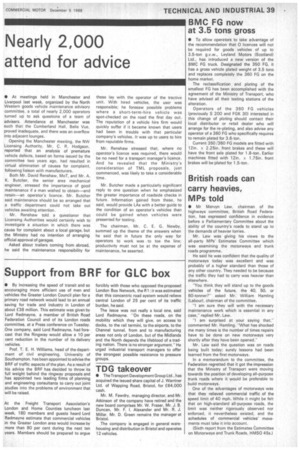Support from BRF for GLC box
Page 41

If you've noticed an error in this article please click here to report it so we can fix it.
• By increasing the speed of transit and so encouraging more efficient use of men and vehicles the Greater London Council plan for a primary road network would lead to an annual saving for trade and industry in London of about £38 million. This estimate was given by Lord Redmayne, a member of British Road Federation Council and of its London roads committee, at a Press conference on Tuesday. One company. said Lord Redmayne. had forecast that the Ringway would allow a 10 per cent reduction in the number of its delivery vehicles.
Prof. T. E. H. Williams. head of the department of civil engineering, University of Southampton. has been appointed to advise the BRF of traffic aspects of the plan. As a result of his advice the BRF has decided to throw its full weight behind the ringway proposals and has appointed two leading firms of planning and engineering consultants to carry out joint studies into the problems of environment that will be raised.
At the Freight Transport Association's London and Home Counties luncheon last week, 180 members and guests heard Lord Redmayne estimate that commercial vehicles in the Greater London area would increase by more than 80 per cent during the next ten years. Members should be prepared to argue forcibly with those who opposed the proposed London Box Network, the R1; it was estimated that this concentric road system would relieve central London of 25 per cent of its traffic burden, he said.
The issue was not really a local one, said Lord Redmayne. "On these roads, on the mobility which they will give, on access to docks, to the rail termini, to the airports, to the Channel tunnel, from and to manufacturing areas not only of London, but of the Midlands and the North depends the lifeblood of a trading nation. There is no stronger argument." He urged industrial transport managers to offer the strongest possible resistance to pressure groups.






















































































































































